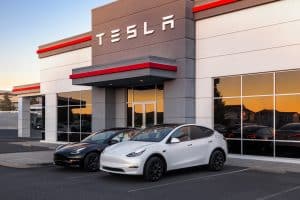- 🚗 Ford is shifting focus from fully electric vehicles to hybrids due to profitability challenges.
- 📉 Ford has taken a $400 million non-cash charge due to stopping all-electric SUV production.
- ⚙️ The next strategy will focus on hybrid technologies for upcoming large SUVs.
- 🚐 Ford will continue producing EVs, focusing on commercial vehicles like the E-Transit van.
- 🛠️ A new mid-sized EV pickup with high efficiency and range is set for 2027.
- 🔋 The T3 electric truck with advanced features is delayed and will launch in 2027.
- 💼 Ford aims to create long-term value by building a competitively profitable business.
- 🎯 Hybrids are currently more popular than pure EVs among consumers, influencing Ford’s strategy.
Ford Motor Company, a stalwart in the automobile industry, is making waves with a significant shift in its business strategy. The iconic automaker has announced plans to pivot from an all-electric focus to embracing hybrid technologies more fully. This decision is driven by several factors, primarily centered around profitability challenges and evolving consumer preferences.
Understanding Ford’s Strategic Realignment
Profitability Challenges and Financial Adjustments
Ford’s journey towards electrification has been met with financial obstacles, prompting the company to reassess its strategy. The automaker has taken a $400 million non-cash charge as part of its decision to cease production of certain all-electric SUVs. This financial move underscores the significant costs associated with producing fully electric vehicles (EVs) and highlights the need for a more sustainable profitability model.
Embracing Hybrid Technologies
As part of its revised strategy, Ford plans to focus on hybrid technologies for its next line of large SUVs. This approach offers a dual advantage: maintaining environmental consciousness while catering to consumer preferences. Hybrid vehicles, which combine traditional internal combustion engines with electric propulsion systems, provide a balanced solution that bridges the gap between gasoline-powered and fully electric vehicles.
A Closer Look at Ford’s Upcoming Initiatives
Continued Commitment to Commercial EVs
Despite its strategic pivot, Ford remains dedicated to the commercial EV sector, an area where it has seen notable success. The E-Transit van, a leader in commercial EV sales, will continue to be a centerpiece of Ford’s offerings. By retaining a strong presence in the commercial EV market, Ford aims to capitalize on the growing demand for efficient and cost-effective electric transportation solutions for businesses.
Introduction of a New Mid-Sized EV Pickup
Ford is also looking to redefine its presence in the EV market with the upcoming release of a new mid-sized EV pickup in 2027. This vehicle is poised to offer increased efficiency, range, and practicality, demonstrating Ford’s commitment to innovation and consumer satisfaction. Built on a platform developed by Ford’s Skunkworks team, this pickup aims to deliver high utility and adaptability across various vehicle styles.
The T3 Electric Truck: A Glimpse into the Future
The highly anticipated T3 electric truck, initially slated for an earlier release, will now hit the markets in the latter half of 2027. Ford promises that this truck will boast upgraded features, including bi-directional charging capabilities and advanced aerodynamics. The T3 will be manufactured at the BlueOval City Electric Truck Center in Tennessee, a facility dedicated to crafting the next generation of electric trucks.
Key Considerations: Consumer Preferences and Market Shifts
Consumer trends are a pivotal factor in Ford’s strategic realignment. Recent surveys indicate that hybrids are gaining popularity over pure EVs among drivers, a pattern that has influenced Ford’s decisions. The hybrid’s appeal lies in its flexibility, offering drivers the convenience of gasoline-powered vehicles with the added benefits of electric propulsion.
Additionally, Ford’s strategy aims to create long-term value by ensuring that new models are competitively profitable from the outset. This approach not only positions Ford to meet consumer demand but also ensures a financially sustainable business model moving forward.
Conclusion: Navigating the Road Ahead
Ford’s decision to pivot from fully electric vehicles to hybrid technologies marks a significant evolution in its longstanding history. By addressing profitability challenges and aligning with consumer preferences, Ford is positioning itself for success in a rapidly changing automotive landscape. The strategic focus on hybrid technologies, continued commitment to commercial EVs, and innovative new model launches are set to redefine Ford’s future in the industry.
As Ford navigates this transformative journey, industry stakeholders and consumers alike will be keenly observing the impact of these strategic initiatives on the broader automotive market.





